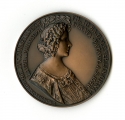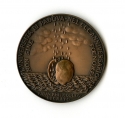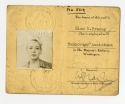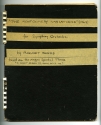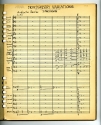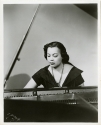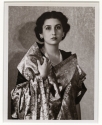For Women’s History Month 2018, this exhibition celebrates exemplary women who were ahead of their time in pushing past boundaries. They were groundbreakers in areas where no woman was expected to tread, much less excel. To be a woman who worked and lived independently of family and spouse was extremely unusual until the middle to late twentieth century. A woman who accomplished this was regarded as unusual or suspect. To be any woman in pursuit of accomplishments beyond her socially or racially recognized role, took strength and determination.
Part I: Courage under Fire
Mata Hari (1876-1917), born Margaretha Geertruida Zelle, traveled from her native Netherlands to Indonesia, at the age of eighteen, in response to an advertisement for a wife placed by Rudolf MacLeod, an army captain from Skye. Unfortunately, the troubled marriage ended in divorce in 1907. Over the years, Zelle found solace and escape from domestic difficulties by immersion in Indonesian culture, especially traditional dance forms. In 1903, she had moved to Paris, where she won acclaim for her free-spirited and daring performances on horseback. In the early twentieth century, travel as a single woman was unusual at the best of times; but particularly risky during wartime. For a while Zelle was able to travel freely across borders as a performer and because of the Netherlands’ neutrality during World War I. Eventually, however, Zelle’s movements drew attention. In 1916, en route from Spain to England, she was detained by Scotland Yard for questioning. In 1917, radio messages between Madrid and Berlin reporting on activities of a German spy were intercepted by French intelligence. Zelle was identified as the spy and arrested in Paris where she was tried and found guilty of treason. She was executed by firing squad on October 15, 1917. In 1985, sealed official case documents were opened at the behest of biographer Russell Warren Howe, who was able to reveal that Zelle had been innocent.
Mata Hari letters
Four signed autograph letters to Jean Hallaure, with whom Zelle was romantically involved; dated circa 1916. Reference to obtaining safe passage to Vittel, a spa that Zelle frequented. Hallaure was a second lieutenant in the Deuxiѐme Bureau (the intelligence branch) of the Ministry of War, Paris, and was responsible for bringing Zelle to the attention of his superior, Georges Ladoux, head of the Deuxiѐme Bureau. Ladoux undertook to gather evidence against Zelle which led to her arrest.
Miscellaneous Manuscripts 2, GTMGamms430, 3:13.1
Helen Keller (1880-1968)
Keller was an outspoken and staunch advocate for the disabled, as well as a pacifist, suffragist, and socialist. She was cofounder with George Kessler of Helen Keller International, an organization for research in vision, health and nutrition; a founding member of the American Civil Liberties Union; and member of Industrial Workers of the World, better known as the Wobblies; as well as member of the Socialist Party of America. Keller became a world-renowned speaker and together with Anne Sullivan, her former teacher and companion until 1936, she traveled to over thirty-nine countries during her lifetime. Her acquaintances included U.S. presidents from Grover Cleveland to Lyndon B. Johnson, as well as Alexander Graham Bell, Charlie Chaplin, and Mark Twain who shared her political views. In 1964, Keller received the Presidential Medal of Freedom; and in 1965, she was elected to the National Women’s Hall of Fame.
Helen Keller autograph note
Signed, undated.
John S. Mayfield Papers, Autographs Series GTM830101a, 3:34
Helen Keller photograph with Lisa Sergio
Dated 1938. Photo credit: Haas, N.Y.
Lisa Sergio papers GTMGamms172, 14:58
Elena Cornaro Piscopia (1646-1684)
Born in Venice, Piscopia was the first woman in the world to earn a Ph.D., in 1678.
Elena Cornaro Piscopia tercentenary commemorative medal
Elena Cornaro Piscopia tercentenary celebration collection GTM790112, 2:25
Part II: Entrepreneurial Spirit -- Maverick explorers and independent business women
Freya Stark (1893-1993), was one of the first women to travel in the Middle East. Stark became famous in her lifetime for writing of her travel experiences and cartography in the region. Her earliest introduction to the Middle East was a gift of the One Thousand and One Nights on her ninth birthday which engendered a life-long obsession. Stark studied Arabic, Persian and history at the University of London and the School of Oriental and African Studies. In 1927 she boarded a ship for Beirut and began her Middle East travels. By 1931, Stark had trekked some of the wildest territory in western Iran, an accomplishment no Westerner had ever achieved. She also located the fabled Valley of the Assassins or Hashishin (a tenth- and eleventh-century militant order of renegades organized by Hassan-i Sabbah) in the hills of northern Iran. Stark’s extensive experiences are chronicled in over two dozen autobiographical books. As a staff member of the British Information Ministry during World War II, she assisted in the creation of the Ikhwan al Hurriya (Brotherhood of Freedom), a propaganda network to persuade Arabs to support the Allies or remain neutral. Her work in the Middle East is memorialized in her book, Dust in the Lion’s Paw. In 1972, Stark was awarded the title “Dame of the British Empire. She died in her hundredth year, in Asolo, Italy.
Freya Stark book
Dust in the Lion’s Paw: Autobiography, 1939-1946 (New York: Harcourt, Brace & World, 1962, c.1961). First American edition, signed.
Rare Books Collection
Freya Stark in Egypt
Photograph, circa 1940s. Credit: Dust in the Lion’s Paw: Autobiography, 1939-1946 (New York: Harcourt, Brace & World, 1962, c.1961, p.68 facing).
Freya Stark autograph letter
From Stark to Ned O’Gorman, with comment on her book. Dated August 28, 1973.
…Dust in the Lion’s Paw [is] what I feel most deeply about a way to bridge the frontiers of race or nation…
Ned O’Gorman Papers, GTMGamms180, 1:76
Sylvia Beach (1887-1962)
The famous bookshop and lending library, Shakespeare and Company, founded by Beach in Paris in 1919, was a literary hub between the world wars for artists and writers including Sherwood Anderson, Simone de Beauvoir, Stephen Vincent Benet, T.S. Eliot, Andre Gide, Ernest Hemingway, Wyndham Lewis, Archibald MacLeish, Ezra Pound, Gertrude Stein, Paul Valery, Thornton Wilder, and William Carlos Williams. Born in New Jersey, Beach lived abroad from an early age, her father serving as associate pastor of the American Church in Paris from 1902 to 1905. Between 1907 and 1916, Beach resided at various times in Florence, Paris and Madrid before settling permanently in Paris in 1916 where she would reside for the next forty-six years until her death in the apartment over her bookshop at 12, rue de l’Odéon. In 1922, Beach became the first and only publisher, for the ensuing ten years, of James Joyce’s Ulysses. During the 1930s, profits suffered both from the Great Depression as well as widening publication of Joyce’s work. The shop continued to survive largely through the efforts of the organization Friends of Shakespeare and Company formed by Gide, Valery and Jean Schlumberger, who arranged for funding drives and readings by literary notables. The Nazi occupation of Paris in 1941 forced the shutdown of Shakespeare and Company, while Beach was interned for some months. In 1959, Beach held an exhibition of books, documents and papers that had been rescued by friends. These are now permanently housed at the Princeton University Library. Beach’s memoir, Shakespeare and Company (1956) provides a detailed account of her years at the bookshop, as well as first-hand observations of Aleister Crowley, Eliot, Gide, Hemingway, Joyce, D.H. Lawrence, Pound, Man Ray, and many others. In 1964, American bookseller George Whitman renamed his Paris bookshop Shakespeare and Company in honor of Beach.
Sylvia Beach (1887-1962) Hommages, (Mercure de France, 1963)
Contributors include Bryher (Annie Ellerman), Malcolm Cowley, T.S. Eliot, Jackson Mathews, Marianne Moore, Maurice Saillet, and Allen Tate.
John L. Brown Papers 4, GTMGamms354, 24:10
Sylvia Beach typed letter
From Beach to John L. Brown with reference to preparing a talk on the publication by Shakespeare and Company of James Joyce's Ulysses. Dated January 20, 1958.
John L. Brown papers 1, GTMGamms167, 1:3
Norah Tracey (1903 - ?)
A young English socialite who, lacking in personal fortune or the support of a spouse, endeavored to make a living through entrepreneurial ventures such as making bespoke travel garments for women, and refurbishing rented apartments.
Norah Tracey advertisements
Tracey sent out letters offering services as a travel garment maker. She charged an average rate of 35 shillings to £2 for a frock.
Dear Madam: I have noticed in the P[ost?] that you are going to Cairo & it struck me that you might like a few good but inexpensive linen frocks…”
Dear Madam – I am sending you by insured Parcel Post four linen frocks for you to judge the quality of my work. I made these for myself & my sister & they have been washed many times so you will see that linen is a good one – I had it direct from Ireland. You will understand that I cannot sell any of these but will make you anything to order at the greatest possible moment in whatever material you like…
Norah Tracey papers, GTM861201, 1:29
Part III: World changers -- Humanitarians and civil rights activists who created change and moved institutions
Margaret Bonds (1913-1972), African-American composer and pianist. Bonds was one of the first Black musicians recognized in the U.S. A life-long friendship with Langston Hughes produced many collaborative works. As artist-activist, Bonds was keenly aware of the importance of representing Black heritage. Her orchestral work Montgomery Variations, composed at the time of the Freedom March in 1965, was dedicated to Martin Luther King, Jr. Works by Bonds have been showcased in performances by Georgetown University (2017 and 2018), along with an exhibition “Margaret Bonds: Composer and Activist” at the Booth Family Center for Special Collections (August 2016-January 2017).
Margaret Bonds music manuscript
Autograph manuscript for Montgomery Variations.
Margaret Bonds papers, GTM130530 12:8
Welthy Honsinger Fisher (1879-1980)
Fisher traveled to China, in 1906, to become headmistress of the Bao Lin School in Nanchang, the only school for girls in a province of forty-five million people. Committed to women’s education and rights, she encouraged her students to develop into modern independent women. Both Fisher and her husband, Frederick Bohn Fisher were friends of Mohandas Gandhi and other leaders of the Indian independence movement. In 1952, Fisher was asked by Gandhi to establish Literacy House in Allahabad, a school that combined literacy with vocational training. Throughout her life, Fisher traveled to study educational systems in Bolivia, Brazil, Mexico, the Middle East, and Peru, as well as China and India. Her focus was especially on women’s education about which she lectured extensively. Believing that the key to improving conditions for women was literacy, Fisher founded the non-profit literacy organizations World Education (1951) and World Literacy of Canada (1955). Fisher was honored by the Indian government with the issue of a commemorative stamp.
Welthy Fisher first day stamp
First day cover commemorative stamp issued by the government of India in honor of Welthy Fisher, 1955.
Lisa Sergio Papers, GTM.Gamms172, 1:25
Phyllis Michaux (1922- )
Michaux was the founder and first president of the Association of American Wives of Europeans (AAWE), a non-profit volunteer organization of American women, resident in France, who share interests in bi-cultural living. AAWE provides information and education on bilingualism, citizenship, education, legal, and voting rights to American citizens living abroad. As an American citizen living in France since 1946, and raising a family with her French husband, Michaux became increasingly concerned about the implications of her children’s dual citizenship. Under Section 301(b) of the U.S. Immigration and Nationality Act of 1952 children born overseas to an American parent could not retain citizenship unless they resided for five consecutive years in the United States between the ages of fourteen and twenty-eight. In 1961, Michaux mobilized a group of fifty concerned mothers who brought their concerns about the citizenship law to the U.S. Department of State. A year later, organized and led by Michaux as the AAWE, the women embarked on letter-writing campaigns to Congress. Through their efforts, the citizenship law was amended in 1968 with the residence period reduced from five to two years. Michaux chronicled the history of AAWE in her book The Unknown Ambassadors: A Saga of Citizenship (1996).
Phyllis Michaux book
The Unknown Ambassadors: A Saga of Citizenship (Bayside, N.Y.: Aletheia Publications, 1996).
(Rare Book Collections)
Princess Niloufer (1916-1989)
She was one of the last members of Ottoman Empire royalty. Childless herself, Princess Niloufer’s great love of children was galvanized by the death of her maid during childbirth and the lack of a specialized hospital for women and children in Turkey. As president of the Hyderabad Women and Children’s Medical Aid Society, Princess Niloufer founded the Niloufer Hopsital in Hyderabad, India, in 1949. With specializations in maternal and pediatric medicine, the hospital opened in 1953. UNICEF aid provided further development of services, and nurse training programs were funded under the auspices of the World Health Organization. Today, more than a thousand children are treated per day on an outpatient basis.
Niloufer Hospital opening announcement
Typed memorandum to Princess Niloufer from K.N. Waghray, Honorary Secretary, Hyderabad Women and Children’s Medical Aid Association, announcing the opening of Niloufer Hospital. Dated May 2, 1953.
Princess Niloufer papers, GTM961216, 8:2
Niloufer Hospital anniversary
Newspaper article on the anniversary of the opening of Niloufer Hospital. Dated April 9, 1954.
Princess Niloufer papers, GTM961216, 8:2
Princess Niloufer photograph
Undated. Credit: Raja Deen Dayals. Nizam’s State Photographers. Secunerabad.
Princess Niloufer papers, GTM961216, Box 6
Sojourner Truth (1797-1883)
African-American abolitionist and women’s rights activist. Born Isabella Baumfree, she adopted the name Sojourner Truth in the belief that she follow God’s calling to share hope. Truth became famous for her 1851 speech on women’s and civil rights “Ain’t I a Woman?” During the Civil War, Truth helped recruit Black troops for the Union Army; and after emancipation, she worked unsuccessfully to secure federal land grants for former slaves. In 2014, she was named by Smithsonian magazine among the “100 Most Significant Americans of All Time". In 2016, the U.S. Treasury Department announced that her image would appear on a newly designed ten dollar bill, together with other significant figures of the 1913 Woman Suffrage Procession. Truth’s legacy inspired poet Katherine Biddle (1890-1977), an influential advocate of members of the Harlem Renaissance, to produce several well-received works about her life.
"Sojourner Truth" theatre programs
Printed programs for performances of Katherine Biddle's play, "Sojourner Truth," by the American Negro Theatre.
Katherine Biddle papers, GTMGamms250, 51:60
"O Freedom!" movie script
Movie typescript for a screen adaptation of the play "Sojourner Truth," by Katherine Biddle.
Katherine Biddle papers, GTMGamms250, 53:2
Curated by Lisette Matano, Manuscripts Archivist



